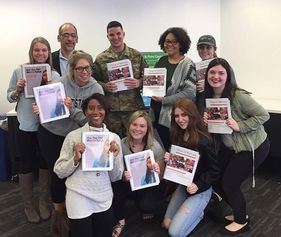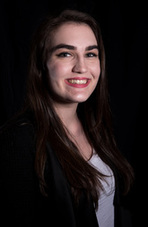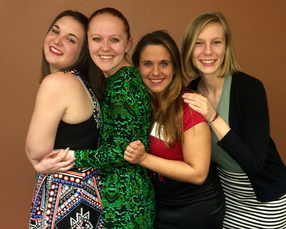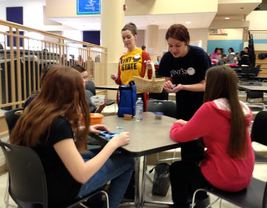 By Natalie Meek The Bateman teams were hard at work the past six months and finalized their campaigns April 5 to turn in their casebooks. Both teams feel confident in their final products, and are proud of the work that they produced for the community. The Bateman Gold team consists of Latisha Ellison, Daniel Henderson, Lauryn Rosinski and Taylor Pierce. Their campaign was for The Campaign to Change Direction, focusing on the mental heath of senior citizens. Bateman Blue consisted of Nicole Zahn, Holly Disch, Brittany Prather, Kristin Slomiany and Charleah Trombitas. This team's campaign was "Are You Ok? #ItIsOkToAsk," which encouraged people to recognize and talk about mental illness. Latisha Ellison stated that she and her Bateman Gold team view their project as a success. "We reached our objectives and felt like we truly made an impact in the senior center community," Ellison says. "We had several seniors tell us they would share this information with their families." After learning about the importance of research in class for so many years, the team members had the chance to experience research significance in a real life campaign. Each team's campaign was based off of the research they conducted. All of this work showed Ellison and her team members that creating a campaign takes a lot of thought and consideration. "Every detail needs thought out and you always need to remember your objectives and goals," Ellison says. Holly Disch of Bateman Blue also agreed that her team's project turned out well. She believes that all of the work they put in the past six months was worth the dedication, and is looking forward to finding out what the judges think of their work. Just as it is in the real world, Disch believes teamwork was an important aspect of this project. "The experience taught me the importance of teamwork, and being there for your friends rather than them just being a part of the school project," Disch says. "There were so many aspects of the real world I got from Bateman, and I will take the lessons of work ethic and time management with me in my future." Although both teams are optimistic about their final products, they both overcame challenges along the way. Disch and team members turned these obstacles into motivation and found it was an important part of the journey. "There were times I thought the book wasn't going to get done, or we were not going to reach our objectives," Disch says. " I think when those feelings hit, it is stressful, but it made me think about what we need to do instead of 'why is this happening.'" Ellison also explained some difficulties that Batman Gold faced, many of which included issues with their target audience. They were targeting the audience of caregivers, however, they realized that not all qualified people identified themselves as such. "For most people, they are caring for a parent, grandparent or spouse, so they were just doing the right thing and didn't compare themselves to paid caregivers," Ellison says. "This was a tough realization for our team because it meant that we had to change our audiences, objectives, tactics, and figure out how to reach an audience who didn't identify themselves." Overall, both teams are excited to receive feedback from the judges and have gained valuable experience by being a part of the Bateman competition. If you are interested in finding more out about the Bateman Case Study Competition, contact Tim Roberts at [email protected].
0 Comments
 By Brenna Parker Each year, ten lucky PR students are selected by the PRKent faculty to compete in the PRSSA Bateman Case Study competition. The Bateman Case Study Competition is PRSSA’s premier national case study competition for public relations students, and allows students the opportunity to work for a national client on a campaign. Students are able to take what they learn in the classroom and in their internship experiences to create and implement a full public relations campaign over the spring semester. From October 2015 to April 2016, my team and I researched, planned and implemented a campaign for Student Veterans of America, a nonprofit organization that provides resources and opportunities to student veterans. The 2016 Bateman Case Study Competition challenged us to raise awareness and spark local and national dialogue around student veterans. We created Supporters of Student Veterans of America (SSVA), an educational movement for those interested in supporting student veterans in their transition from the military to the college classroom. The educational program consisted of six videos that aimed to help supporters understand the challenges student veterans face. The SSVA website provided supporters with resources to suggest to student veterans who may be facing challenges in their transition to college. Supporters of Student Veterans of America is dedicated in memory of Bradley "Sonny" Sonenstein, a student veteran at Kent State University who died in November 2015. The campaign earned an honorable mention in the Public Relations Student Society of America’s annual Bateman Case Study Competition. The Bateman Blue team was one of 16 entrants out of 70 from across the country that earned honorable mention. This is the second time in three years and the third time since 2008 a PRKent Bateman team was recognized with an honorable mention. My advice to students taking this course:
Check out my team's website, Facebook, Twitter, YouTube and Instagram accounts and casebook. For more information about the National Bateman Case Study Competition, visit http://prssa.prsa.org/scholarships_competitions/bateman or contact Tim Roberts at [email protected]. Brenna Parker is a senior public relations major and is PRSSA Kent's vice president of professional relations. Contact her at [email protected].  By Lauren Biertempfel Being a part of the PRSSA Bateman Case Study Competition is probably one of the most rewarding things for young public relations professionals. Bateman gives great chances to grow as a professional, expand a portfolio and put the knowledge learned in the classroom to work. Bateman is time consuming and fast-paced, and worth every second that is put into it. For any student who is in Bateman, or wants to be, I have a few tips from my personal experience that will help you successfully survive Bateman. 1. Be prepared to invest a lot of time: Bateman is time consuming. You will spend long nights in the library with your team conducting research and creating your plan. If you go into the competition with the intention of investing a lot of time into it, you will do great! 2. Learn to love your team and leave the drama behind: Your teammates will become your best friends, the people you text at 2 a.m. when you get an idea for the cover of the campaign or come up with new tactics. You do not get to choose your team, but keep in mind that you were all placed together for a reason. 3. Grammer is important! Yes, I did that on purpose. The judges will notice and deduct for grammar errors. Make sure your casebook is flawless both visually and grammatically. Your casebook will be printed and kept as an example for years to come 4. Become best friends with your client: The more comfortable your client is with you, the more they are willing to work with you. It may be difficult to get them to open up at first, but adapt to their needs. Remember that this is a competition, but your plan should resemble your client’s ethics and morals. 5. Be creative and have fun! Bateman is one of the best experiences you will have in college, and it is a great asset to your resume. It is so easy to become stressed with the workload, but you and your team will balance each other out. This is your chance to show what you know, so be creative and have fun with it!  by Shannen Laur This time last year, I was nearing the end to one of the most valuable projects I have completed in my entire college career. It was PRSSA’s National Bateman Case Study Competition, and it was a whirlwind of a learning experience. Working with four other faculty-selected students, we researched, implemented and evaluated a real-world public relations campaign with the objective of spreading awareness about childhood bullying. Real-World PR This experience, which was less than three months long, was by far the most important learning experience I had in my up-and-coming PR career because I was actually able to implement real-world public relations tactics. Of course, everything I have learned in the classroom has been of the utmost importance to me, but I was able to take what I learned in the classroom and apply it to a real campaign. The Campaign The Bateman Competition taught me more than I had expected. Through three months of stress, late nights and team bonding, the Kent State Blue Team successfully completed its case book and campaign, which my teammates and I named Bullies 2 Buddies. In January, we spent hours researching, followed by a month of implementation in February. During February, we partnered with the local middle school in Kent, Stanton Middle School, and actually got to work with seventh graders to implement our tactics. To wrap up the campaign, we evaluated our work in March and submitted it to PRSSA for judging. Learning Experiences Although our team did not place in the competition, all of the learning experiences my teammates and I shared count as personal victories. We became more than just a team; we became friends who will always be able to reflect on our first real-world experience together. From a PR standpoint, what I learned is invaluable. I learned how critical research is to the success of a campaign. I had created case studies in classes previously but this was different. Without solid, thorough research, the campaign will not be a success. I also learned not only how interesting (and at times intimidating) it is to work with middle schoolers, but also how much planning goes into creating tactics. Since the Bullies 2 Buddies campaign was actually implemented, we were able to see our tactics in action. We also had to learn to cope when they did not go exactly as planned, or what to do when a bunch of twelve-year-olds are not as cooperative as hoped. Overall, this was the one of the most rewarding experiences I have had the pleasure of participating in. My advice to future Bateman team members is to see the light at the end of the tunnel. It was extremely stressful when we were in the process, but when we got to see the case book printed, it was finally time to take a deep breath and realize why it was all worth it. |
Archives
February 2024
Categories
All
|
 RSS Feed
RSS Feed
